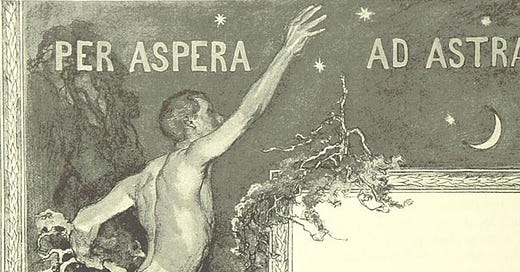What makes for happiness?
Acceptance is a good part of it: acceptance of self, of one's ineluctable limitations, of others and their limitations, of one's lot in life, of one's place in the natural hierarchy of physical prowess and intellect and spiritual capacity, acceptance of the inevitable in the world at large.
Gratitude is another ingredient in happiness: one cultivates gratitude for and appreciation of what one has here and now without comparisons to an idealized past, a feared future, or to the lots of others. One avoids regret, resentment, worry, and comparison. Comparison breeds envy. Not always, but too often. To feel diminished by the success or well-being of another is not only foolish, but counts as one of the seven deadly sins. Be your incomparable self. If you are not yet incomparable, take up self-individuation as a life project. Realize yourself. Your life is more a task than a given, a task of transmuting the givens of natural endowment and social circumstance into accomplishments. It is the task of becoming actually the unique person you are potentially. But no hankering for what is out of reach. No false ideals. No consorting with the utopian. No Lennon-esque imagining of the impossible. No dreaming impossible dreams.
And yet one cannot live well in this world without hope. It is arguable, though not provable, that one cannot live maximally well in this world without also hoping beyond it. This, for some, will be psychologically impossible. If it is psychologically possible for you, then go for it. You will be in the company of great minds. The belief that death does not spell the annihilation of the person is not unreasonable. But then your life-task will be all the harder: live in such a way as to deserve a life beyond the grave.
You were born somewhere in the natural hierarchy of physical endowment, moral and affective and aesthetic sensitivity, mental power, spiritual capacity, and strength of will. But your place in the hierarchy allows for development. Know your place but press against its upper limits. You have it in you to climb a few rungs up life’s ladder.
Happiness, however, is not just a matter of attitude and exertion but also rests on contingency and luck. We need, but cannot command, the world's cooperation. Happenstance holds happiness hostage. You were dealt a bad hand? Suck it up and play it the best you can for as long as you can.
Conservatives emphasize attitude and exertion, leftists happenstance. Both have a point. "The harder I work, the luckier I become" is a conservative exaggeration, but a life-enhancing one. It is however the foolish conservative who thinks he is self-made and not the beneficiary of a myriad of forces and factors far beyond his control. There is truth in Phil Ochs' lament, "There but for fortune go you or I," but not such truth as to trump the conservative's exaggeration. Weathering "the slings and arrows of outrageous fortune," (Hamlet, Act III, Scene I) he will slog on, per aspera ad astra. He will live and strive through hardships to the stars.




